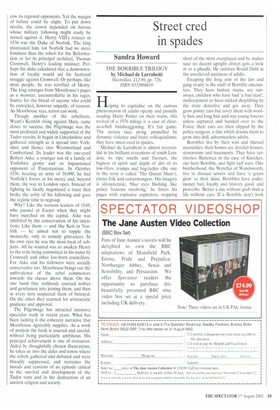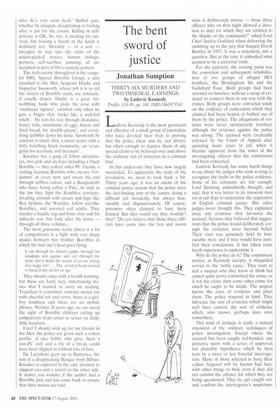Street cred in spades
Sandra Howard
THE BORRIBLE TRILOGY by Michael de Larrabeiti Macmillan, £12.99, pp. 726, ISBN 0333908619 Hoping to capitalise on the curious phenomenon of adults openly and proudly reading Harry Potter on their trains, this revival of a 1976 trilogy is a case of clearas-a-bell bandvvaggoning. It's fair game. The stories race along, propelled by dynamic violence and fruity colloquialisms; they have street cred in spades.
Michael de Larrabeiti is almost reverential in his brilliant evocations of south London, its ripe smells and flavours, the bigness of spirit and depth of dirt of its low-lifers, tramps and bag-ladies (the one in the story is called 'The Queen Mum'), circus folk and costermongers. His imagery is idiosyncratic, 'blue eyes flashing, like police beacons revolving,' he litters his pages with explosive expletives, stopping short of the most overplayed and he makes sure no decent upright citizen gets a look in or a plaudit. He outdoes Roald Dahl in the unrelieved nastiness of adults.
Escaping the long arm of the law and gang rivalry is the stuff of Borrible encounters. They have fantasy status, are runaways, children who have had 'a bad start', maltreatment or been nicked shoplifting by the store detective and got away. They grow pointy ears but cover them with woolly hats and long hair and stay young forever unless captured and handed over to the Force; their ears are then clipped by the police surgeon, a fate which dooms them to grow into dull, adventureless adults.
Borribles live by their wits and thieved necessities; their homes are derelict houses, storerooms and basements. They have territories, Battersea in the case of Knocker, our hero Borrible, and fight turf wars. One brotherhood, the Wendles of Wandsworth, live in disused sewers and have 'a green glow' to their skins. Borribles have codes: money bad, loyalty and bravery good, and proverbs: 'Better a day without grub than a life without ears. If a Borrible don't look
alive he's very soon dead.' Spilled guts, whether by catapult, decapitating or boiling alive is par for the course. Killing in selfdefence is OK. So, too, is stealing for survival, but leaving a friend in the lurch is definitely not. Morality — of a sort — inveigles its way into the veins of the action-packed stories; human failings, prowess, self-sacrifice, cunning, all are accepted as part of life's raunchy pattern.
The arch-enemy throughout is the vengeful SBG, Special Borrible Group, a unit attached to the Met. Sergeant Hanks and Inspector Sussworth, whose job it is to rid the streets of Borrible scum, arc riotously, if cruelly drawn. Hanks is a great fatwobbling hunk who picks his nose with 'unalloyed rapture', satisfied only when he gets a bogey that 'looks like a well-fed whelk'. He eats his way through chocolate, honey rolls, mountains of eggs, bacon and fried bread, his 'double-greasy', and everything dribbles down his tunic. Sussworth by contrast is small, thin, a mean zealot with a little twitching black moustache. an 'evangelist for rectitude and decorum'.
Knocker has a gang of fellow adventurers, two girls and six boys including a black Borrible — they collect other PC friends, a visiting German Borrible who, swears 'Verdamint' at every turn and meets his end through selfless valour, and a Bangladeshi who hates being called a Paki. As well as the law they fight the Rumbles, territoryinvading animals with snouts and lisps like Roy Jenkins, the Wendles, fellow war-like Borribles, and assorted evil adults. They murder a baddie rag-and-bone man and his imbecile son, but look after his horse — through all three volumes.
The most gruesome scene (there is a lot of competition) is a fight with very sharp spades between two brother Borribles in which the had one's head goes flying.
It cut through his Adam's apple, through his windpipe and jugular and out through the spine and it made the sound of an axe slicing into soggy turf .... The severed head seemed to hang in the air for an age.
They should come with a health warning, but these are hard, racy, entertaining stories that I wanted to carry on reading. Treachery is contained, violence meted out with cheerful wit and verve, there is a girlboy fondness and there are no mobile phones. Written 26 years ago, we are saved the sight of Borrible children calling up compatriots from sewer to sewer on dinky little handsets.
I feel I should stick up for my friends in the Met; the police are given such a rotten profile. A nice bobby who gives them a non-PC cuff and a bit of a break could have been slipped in without loss of face.
De Larrabeiti grew up in Battersea, the son of a disappearing Basque from Bilbao. Knocker is captured in the end, doomed to clipped ears and a return to the other side. It makes you wonder if the author had a Borrible past and has come back to ensure that their stories are told.































































 Previous page
Previous page